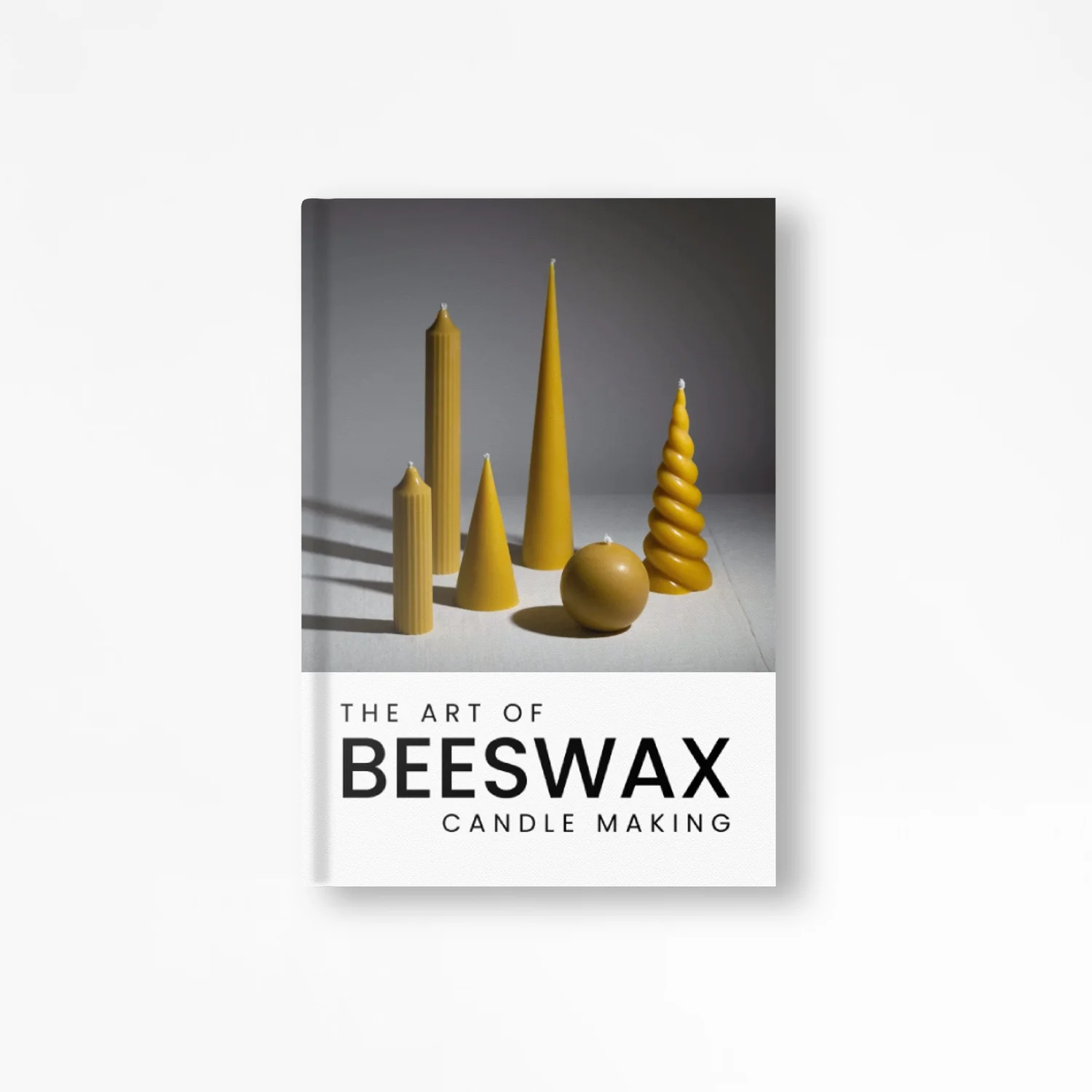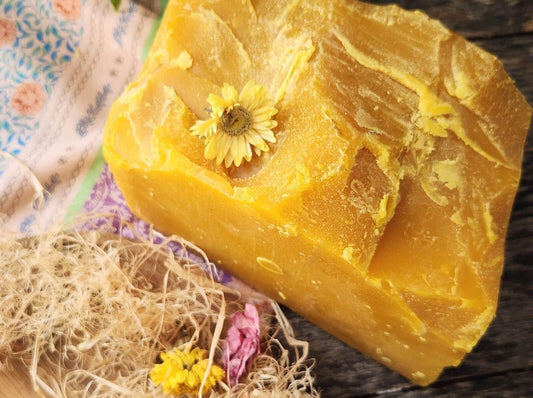Beeswax is a fascinating natural substance produced by honeybees and has been used for thousands of years in various applications, from candle-making to cosmetics. But when it comes to eating beeswax, many people wonder: Is beeswax edible? In this comprehensive guide, we’ll explore the properties of beeswax, its potential benefits and risks, and whether it can safely be consumed.
What is Beeswax?
Beeswax is a natural wax produced by honeybees in the genus Apis. The worker bees secrete this wax from glands on their abdomens and use it to build the honeycomb structure inside their hives. The honeycomb serves as both a storage facility for honey and pollen and as a nursery for developing larvae. Beeswax is composed of various compounds, primarily esters of fatty acids and long-chain alcohols, which give it a solid structure and water-resistant properties.
Is Beeswax Edible?
The short answer is yes, beeswax is technically edible. However, there are several considerations to keep in mind:
1. Natural Composition
Beeswax is composed of natural substances that are generally non-toxic to humans. It includes long-chain fatty acids, alcohols, hydrocarbons, and aromatic compounds. These components are not harmful and do not pose a risk if consumed in small quantities. In fact, beeswax is often used as a food additive or coating, as it is recognized as safe by food regulatory authorities such as the U.S. Food and Drug Administration (FDA).
2. Uses in the Food Industry
In the food industry, beeswax is commonly used as a glazing agent or coating. You may find it in products like:
- Chewing Gum: Beeswax is used as a natural chewing gum base.
- Fruit Coatings: It is often applied to fruits like apples and pears to create a shiny, protective layer that extends shelf life.
- Candies and Chocolates: Some candies and chocolates use beeswax as a glaze to provide a smooth, glossy finish.
- Cheese Coating: Beeswax can be used as a coating for certain types of cheese to prevent mold growth and preserve freshness.
Because beeswax is utilized in these ways, it is evident that small amounts are safe for consumption.
3. Nutritional Value
While beeswax is edible, it does not provide significant nutritional value. It is not a source of vitamins or minerals, nor does it contain protein or carbohydrates. Essentially, beeswax is a type of fiber that passes through the digestive system without being absorbed. As a result, consuming beeswax will not provide any nutritional benefits.
Potential Benefits of Consuming Beeswax
While beeswax itself does not offer substantial nutritional value, some proponents suggest a few potential benefits associated with its consumption:
-
Natural Laxative: Beeswax is considered a form of indigestible fiber. In some cases, consuming it in small amounts may help with bowel movements by acting as a natural laxative.
-
Anti-Inflammatory Properties: Some studies have suggested that beeswax has anti-inflammatory properties that may benefit digestive health when ingested in small amounts. However, more research is needed to confirm these effects.
-
Potential Allergy Relief: Raw honeycomb, which contains beeswax, pollen, and honey, is sometimes consumed as a natural remedy for allergies. The theory is that consuming small amounts of local pollen can help build tolerance to allergens. However, this remains anecdotal and not scientifically proven.
Potential Risks of Consuming Beeswax
While beeswax is generally safe to consume in small amounts, there are a few potential risks to consider:
-
Digestive Issues: Consuming large quantities of beeswax may cause digestive discomfort, including stomach cramps or diarrhea, due to its indigestible nature.
-
Choking Hazard: Beeswax is a dense, chewy substance that could pose a choking hazard, especially for young children or individuals with swallowing difficulties.
-
Allergic Reactions: Although rare, some individuals may be allergic to bee products, including beeswax. Symptoms of an allergic reaction may include itching, swelling, difficulty breathing, or anaphylaxis in severe cases. If you have a known allergy to bees or bee products, it’s best to avoid beeswax.
-
Contamination: Beeswax may be contaminated with pesticides or chemicals used in beekeeping or in the environment where the bees forage. Consuming beeswax from a non-reputable source could expose you to these contaminants. It's important to source beeswax from trusted suppliers that practice sustainable and chemical-free beekeeping.
How to Safely Consume Beeswax
If you decide to consume beeswax, here are a few tips to do so safely:
-
Opt for Food-Grade Beeswax: Ensure that the beeswax you consume is food-grade. Food-grade beeswax is produced and processed with the intention of being safe for consumption.
-
Moderation is Key: Consume beeswax in small amounts to avoid potential digestive issues or other adverse effects.
-
Choose Raw Honeycomb: If you want to experience beeswax as part of your diet, consider consuming raw honeycomb. Honeycomb consists of beeswax cells filled with honey, providing a natural and minimally processed option. It is often enjoyed by cutting a small piece of honeycomb and chewing it, extracting the honey while discarding the wax.
-
Consult a Doctor if You Have Allergies: If you have a history of allergies, particularly to bee products, consult with a healthcare professional before consuming beeswax.
Conclusion
In summary, beeswax is technically edible and is considered safe for consumption in small amounts. While it does not offer significant nutritional benefits, it is often used in the food industry as a coating or additive. However, it’s important to be mindful of potential risks, such as digestive discomfort, allergic reactions, and possible contamination. As with any substance, moderation and sourcing from reputable suppliers are key to safely enjoying beeswax.
Frequently Asked Questions (FAQs)
Q: Can you eat beeswax straight from the hive?
A: Yes, you can eat beeswax straight from the hive, often in the form of honeycomb. However, it’s advisable to consume it in small amounts and be cautious if you have allergies.
Q: What does beeswax taste like?
A: Beeswax has a mild, waxy taste. It is generally flavorless but may have a slight honey-like taste if consumed as part of a honeycomb.
Q: Is beeswax safe for children to consume?
A: While beeswax is generally safe, it should be consumed with caution, particularly by young children, due to its dense, chewy texture, which could pose a choking hazard.
Q: Can beeswax be used as a substitute for other edible waxes?
A: Beeswax can sometimes be used as a substitute for other edible waxes, such as carnauba wax, in certain applications, such as candy coating. However, it has different melting properties and a distinct texture.
Q: Does beeswax have any medicinal properties?
A: While some believe beeswax has medicinal properties, such as anti-inflammatory effects or benefits for allergies, these claims are not well-supported by scientific research and should be approached with caution.
By understanding the properties of beeswax and its uses in the food industry, consumers can make informed decisions about whether and how to incorporate it into their diets safely.










